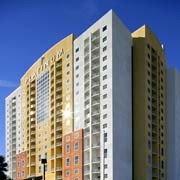If there is any trend that has dominated the hotel industry in recent years, it’s that a hotel is not just a hotel. More often than not, any new full-service hotel opening these days includes some kind of residential component, whether it’s condos, timeshares, fractional ownership villas, or single-family homes.
There are now so many different types of these hotels with residences that it can get confusing. While many include residential units that are strictly for the use of owners, the true condo-hotel is a property where all or most of the units, while individually owned, are available to overnight guests.
Although condo-hotels have been around for decades, particularly in ocean and mountain resort destinations, never have they been so numerous and diverse. At the same time, condo-hotels are increasingly popping up in urban locations.
In some areas, however, the pace of condo-hotel development is slowing down as the softening real estate market puts a damper on buyers’ enthusiasm. This is especially true in South Florida, where the market has become saturated with condo properties and the demand for units has cooled.
Shared Risk
For a variety of reasons, both sociological and economic, condo-hotels are a development trend that is likely to continue, although perhaps at a more cautious rate than in the past.
According to Joel Greene, president of the Condo-Hotel Center, a Miami-based real estate firm specializing in hotel condo sales, escalating construction costs and the continuing difficulty that developers face in obtaining financing for full-service hotels have been the driving forces behind the trend.
“With condos, the developer is able to get things pre-sold and so is able to build using other people’s money. There’s much less risk,” he says. “Then, once the condo-hotel is built, you still get lots of revenue streams—from the overnight guests, plus from the spa, bars and other components of the hotel.”
For hotel companies such as Hong Kong-based Shangri-la Hotels & Resorts, the ability to be part of mixed-use complexes with condos has paved the way for its upcoming expansion into Vancouver, Chicago, Miami, Las Vegas, and Toronto.
“Developers save a lot of money by spreading the risk around, and it gives us the ability to get into advantageous locations that we couldn’t get into otherwise,” says Stephen Darling, regional vice president-North America for Shangri-La. “It also means that our operating costs are lower because we share them with the homeowners’ association. On top of that, we expect that the condo owners will use our restaurants and lounges.”
Rising demand for vacation homes, particularly from baby boomers, is also spurring condo-hotel development, according to Green.
“Boomers are at their financial earning peak right now and they are looking at where to put their money,” he says. “They like to travel, but they have responsibilities at home. Owning a condo in a hotel means hassle-free ownership.”
Development Hot Spots
Although condo-hotels are being built in a wide variety of locations, resort destinations still dominate. According to hospitality industry consultants, the reason is that popular resort destinations tend to be strong markets for hotels and condos both, not just one or the other.
“An area that needs a hotel, such as an airport or industrial park, is not necessarily good for a condo-hotel,” says Los Angeles-based hospitality industry attorney and consultant Jim Butler. “Good hotel and good condo markets are not necessarily one and the same.”
Perhaps the two biggest U.S. markets for condo-hotels right now are Orlando, Fla., and Las Vegas. In Orlando, several large condo-hotel projects with substantial amenities for meetings are under way.
Among the most high-profile of these developments is the Village of Imagine, a 1,000-unit condo-hotel complex adjacent to Orlando’s Orange County Convention Center. Scheduled to open in fall 2008, the complex is under development by Intrawest Corp., the operator behind condo-resort complexes in Whistler, British Columbia; Squaw Valley, Calif.; Lake Las Vegas, Nev.; Copper Mountain, Colo.; and other locations.
Like other Intrawest properties, Village of Imagine will be a pedestrian-friendly resort where the condos are interspersed among restaurants, retail shops and landscaped plazas and walkways. An elevated walkway will directly link Village of Imagine to the convention center.
Under development in nearby Lake Buena Vista, the Ravallo Resort & Conference Center will offer 900 condo-hotel units and an adjoining 100,000-square-foot conference facility. The 23-story lakeside resort is scheduled to break ground later this year, with completion set for fall 2008.
Other major condo-hotels coming to Orlando include the Sonesta Orlando Resort at Tierra Del Sol, which is expected to open in early 2008 with 972 units, meeting rooms, a full-service spa, miniature golf, a wave pool, and other amenities. Also set to open next year is The Blue Rose, a luxury condo-hotel tower with 1,300 units, 100,000 square feet of conference space, a rooftop pool, and a 1,000-seat theater presenting Broadway-style productions.
In Las Vegas, recently opened condo-hotel properties include the 255-unit Platinum Hotel, located a block off the Las Vegas Strip, and The Signature at MGM Grand, where two 565-unit towers have already opened and a third is slated to open in July. Two of the three towers each offer two meeting rooms and an executive boardroom.
Among major projects in the works is the 1,282-unit Trump International Hotel & Tower Las Vegas, opening early next year with a full-service spa, a fitness center, a pool deck, casual and fine-dining restaurants, and a business center with meeting facilities. Following in 2009, the W Las Vegas will offer a mix of 3,000 hotel guest rooms and condos, some of which will be available to overnight guests, along with 300,000 square feet of meeting space, 10 restaurants and bars, a full-service spa, and a casino.
Groups Wanted
While some condo-hotels are purely oriented for leisure guests, many actively target meetings with the pitch that their spacious accommodations make them a good choice over standard hotels.
Among them is Las Vegas’ Platinum Hotel, which has found a successful niche among small corporate groups, according to General Manager Peter Rockwood.
The hotel offers a rooftop function area as well as five interconnected conference rooms that accommodate up to 125 people. In addition, the condo suites, which include eight two-bedroom units with large parlors and dining areas, can also be used for breakout space or for entertaining.
“We’re getting high-end corporate meetings as well as groups connected with trade shows,” Rockwood says. “Exhibitors are a good market as they can use connecting suites for product displays.”
Group demand is growing at Intrawest’s Village at Squaw Valley, which offers 276 one-, two- and three-bedroom condos along with 5,550 square feet of meeting space and two dozen restaurants and shops. The resort plans to add a 2,500-square-foot meeting room with floor-to-ceiling windows by the end of this year.
According to Director of Sales Christy Beck, the resort does a brisk business with groups who prefer the spacious condos with fireplaces and full kitchens to hotel rooms.
“We get a lot of repeat meetings clients, including some that come every year and offer the condos as a thank you for their top clients,” she says. “The condos are also very popular for executive retreats and for medical continuing education meetings, where a lot of the participants bring their families. The kids get their own bedroom and bathroom.”
While the resort, which is just below the ski slopes of Squaw Valley and 10 minutes from Lake Tahoe, is heavily booked during winter, Beck says groups shouldn’t rule out ski season.
“There are often good deals if you come midweek,” she says. “For instance, a group from Google comes every winter during midweek and puts one person in each bedroom of the condos. So it’s very comparable to a hotel in price.”
While condo-hotels are benefiting from the hotel sellers’ market just as other properties are, the softening real estate market is making them an affordable option in some areas. At least that has been the experience of independent meeting planner Walter Caudle, owner of the MMTG Group in Columbia, S.C.
“I’m finding that condo-hotel properties are a good deal now on the Carolina coast as there’s been a real slowdown there in second home sales because of insurance costs,” he says. “So there’s more availability for guests.”







